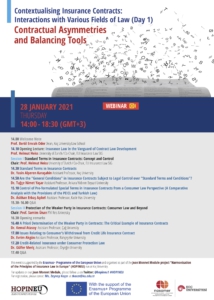Views
Nothing Found
Sorry, no posts matched your criteria
News
First Issue of 2021’s International and Comparative Law Quarterly
The first issue of 2021’s International and Comparative Law Quarterly has recently been published. It features a book review by Dr. Nahel Asfour of Dr. Gianluigi Passarelli’s book titled “Contract Law in Contemporary International Commerce: Considerations on the Complex Relationship between Legal Process and Market Process in the New Era of Globalisation [Nomos, Baden-Baden, 2019]. ” It contains no other topic that is directly on private international law.
On a personal note, I have earlier read Dr. Passarelli’s book to completion at least twice, and found it to be thought provoking and interesting. Dr Passarelli proposes an approach that gives principal focus to a contract as a wealth creation mechanism in addressing private international law matters. He argues that this approach should not be rigid but allow some gap-filling by the judges to a private international law contract.
He then applies this logic to the applicable law in the absence of choice under Rome I Regulation, and challenges the approach of the European Union (“EU”) legislator for giving too much emphasis to certainty through hard and fast rules, at the expense of flexibility. In this connection, he argues that the EU legislator’s approach is contrary to the expectations of international commercial actors. The thesis of his book is that legal certainty in choice of law in determining the applicable law in the absence of choice is overrated under Rome I Regulation.
It is unlikely that the EU legislator at present will be convinced by Dr. Passarelli’s argument that elevates the role of flexibility in the choice of law process, or accept a “regression” to Article 4(5) of Rome Convention style of flexibility that produced uncertainty among Member State Courts. Legal certainty, predictability and uniformity are the cornerstone of EU private international law. My verdict is that Dr. Passarrelli’s work will remain relevant to students, scholars, practitioners, judges and legislators who prize flexibility over legal certainty in private international law.
In Memoriam Prof. Jonathan Fitchen
![]()
Written by Abubakri Yekini
We wish to share with us the shocking news of the demise of Professor Jonathan Fitchen. Prof Fitchen died today, Friday 22nd January 2021. His death was announced by Prof Greg Gordon, the Head of Aberdeen Law School in an e-mail sent to colleagues earlier today.
Until his death, Fitchen was a Professor of Law at the University of Aberdeen, Scotland. He was also the Director of the Centre for Private International Law and the Convenor of the Board of Examiners for the Law School. Prof Fitchen is the author of The Private International Law of Authentic Instruments which was published in the Hart Studies of Private International Law in November 2020. The first chapter is currently accessible for free online.
Prof Fitchen was promoted to a Personal Chair a week before his death. On a personal note, this was a piece of cheering news to me. I am glad that Prof Fitchen received the news of his promotion and witnessed the publication of the book that has taken him several years of hard work before he died.
Prof Fitchen (together with Prof Beaumont) supervised my PhD thesis which I defended in May 2020. Despite his health challenges, he would always create time to discuss my thesis with me and his feedback is always excellent. He was a great mentor.
He is survived by his wife Kathrin and his children Thomas and Sofia.
Addendum Jan 26: The University of Aberdeen has published a tribute.



